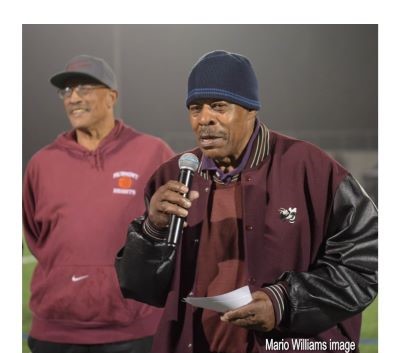
’67 Maryland State alum Ralph Paden revered in Prince George’s County
Wednesday, April 1, 2020
UMES alumnus Ralph C. Paden Sr. is a widely admired “father figure” by those whose lives he touched over a three-decade career as a Prince George’s County (Md.) educator.
His father, seeking reliable employment, moved the family from Greenville, S.C. when Paden was 2½ to Port Henry in upstate New York, a predominantly white community on Lake Champlain. He played football, basketball and ran track for Moriah Central High School – inspired by his “much faster” older brother – and was the lone black in his graduating class.
An African-American music teacher pointed Paden in the direction of Maryland State, where he majored in physical education with a minor in biology. As a freshman, he tried out for the track team coached by the legendary Clifton “Cappy” Anderson and made the roster.
Both had no way of knowing it, but that coach-athlete connection set Paden on a path that resulted in parallel tributes.
UMES’ track and field venue is named for Anderson. The Fairmont Heights (Md.) High School football stadium, where Paden patrolled the sidelines as a coach for 30 years, was re-dedicated in his honor in 2018.
Anderson “was a man with a big laugh,” he said. “There was a lot of laughter to him. He tried not to demean anybody. But he could put his foot down when he had to. He had everyone’s respect.”
Anderson also was results-driven; when Paden proved he could outrun an upperclassman about to graduate, the coach made sure Paden slid into a work-study slot that helped him defray college expenses in lieu of non-existent scholarships.

As a member of Maryland State’s class of 1967, Paden was among Maryland State students who played a role locally in the dramatic societal changes that defined the second half of the 20th century.
He witnessed a cross-burning on a field adjacent to the football field and remembers thinking that “It scared the hell out of me. How can they hate us this bad and we don’t even know them?”
Paden joined fellow students led by vocal athletes in protesting local business segregation policies, suffering a cut to his face by water from a high-pressure fire hose used to disperse the crowd.
He also immersed himself in college life as a student-athlete who excelled in the classroom and flourished as a member of the track team, which he represented as captain in his senior year.
After graduation, Paden went on to distinguish himself as a teacher and coach in Prince George’s County, initially at the now-defunct Mary McLeod Bethune Junior High school, then at Fairmont Heights high.
In a 2018 video tribute produced by the Prince George’s public school system, former colleague George Wake described Paden as “a better person than a coach. (And) I thought he was very good coach.”
“We never thought about how many wins we’d have, how many losses,” Wake said. “We worried about ‘take care of our kids that day – that time.’ If a kid … our team had a problem, we had a problem.”
Paden’s teams won 177 games – many accomplished by rosters with fewer than 30 players, an achievement the Maryland High School Football Foundation says ranks among the state’s top coaching achievements.
“The kids I had all those years, they played hard,” Paden said. “I had guards who weighed 165 pounds.”
Winning 62 percent of his games earned him induction in the state football coaches association’s Hall of Fame in 2003 along with Doug Fleetwood of Cambridge-South Dorchester, and Morgan Wootten of DeMatha in Hyattsville. (Wootten was a successful football coach in the 1960s before focusing exclusively on basketball.)
Fairmont Heights decided a November 2018 home playoff game was an ideal time to salute “Coach Paden.” A rainy night did not deter former players from attending the stadium renaming ceremony.
“He was a great coach, but he was (also) a father figure,” said Carlos Prillman, a1987 Fairmont Height alum who played four years. “When you’re 14, 15, 16 and 17, hey, you need a little guidance. We had some of the greatest guidance between Coach Paden and the rest of the coaches.”
Rodney Williams played for Paden and now fills his shoes as Fairmont Heights’ head football coach.
Williams said seeing his mentor honored by the stadium naming “… means a lot to me. He’s a great coach and a great mentor. I’ve been able to come back and give these kids what was taught to me.”
Paden said he was humbled by the school system’s gesture to honor him with the stadium naming, and by the turn out of former players to celebrate with him.
“Our players,” he said, “…can have the satisfaction of coming back years from now and saying ‘Coach Paden coached me’.”
Paden said he found motivation by believing that “if you do something long enough, hopefully someone will notice.
In the school system’s tribute video, Paden said, “You want to leave something there that’s tangible. If I can do it, you can do it. Don’t let … other things stop you.”

